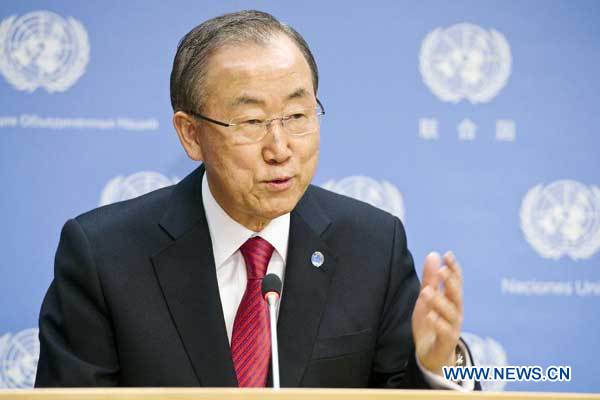 |
| UN Secretary-General Ban Ki-moon speaks during a press conference on the death of Nelson Mandela, at the UN headquarters in New York, on Dec. 5, 2013. UN Secretary-General Ban Ki-moon Thursday mourned the passing of former South African President Nelson Mandela and gave his "deepestcondolence" to the family of Mandela and the people of South Africa and Africa as a whole. (Xinhua/UN Photo/Mark Garten) |
UNITED NATIONS, Dec. 5 -- UN Secretary-General Ban Ki- moon Thursday mourned the passing of former South African President Nelson Mandela and gave his "deepest condolence" to the family of Mandela and the people of South Africa and Africa as a whole.
"I am profoundly saddened by the passing of Nelson Mandela," Ban told reporters here. "Nelson Mandela was a giant for justice and a down-to-earth human inspiration."
Mandela died on Thursday at the age of 95 after a prolonged lung infection, South African President Jacob Zuma announced.
"On behalf of the United Nations, I extend my deepest condolences to Nelson Mandela's family, the people of South Africa, and indeed our global family," the UN secretary-general said.
All representatives of the 15 UN Security Council members, who were attending an open council meeting on Thursday afternoon, rose and stood in silent tribute.
Mandela spent 27 years in prison after being convicted of treason by the then white minority government in South Africa, only to forge a peaceful end to white rule by negotiating with his captors after his release in 1990.
He led the African National Congress, long a banned liberation movement, to a resounding electoral victory in 1994, the first fully democratic election in the country's history.
Mandela, who served as President of South Africa from 1994 to 1999, had battled health problems in recent months, including a recurring lung infection that led to numerous hospitalizations.
The former South African president was released from hospital in early September following an 85-day stay for a recurring lung infection, the result of his longtime imprisonment during the apartheid times.
"Nelson Mandela devoted his life to the service of his people and humanity, and he did so at great personal sacrifice," Ban said. "His principled stance and the moral force that underpinned it were decisive in dismantling the system of apartheid."
Remarkably, he emerged from 27 years of detention without rancor, determined to build a new South Africa based on dialogue and understanding, Ban said. "The Truth and Reconciliation Commission established under his leadership remains a model for achieving justice in societies confronting a legacy of human rights abuses."
"Many around the world were greatly influenced by his selfless struggle for human dignity, equality and freedom," Ban said. "He touched our lives in deeply personal ways."
"At the same time, no one did more in our time to advance the values and aspirations of the United Nations," he said. "Nelson Mandela showed what is possible for our world and within each one of us -- if we believe, dream and work together for justice and humanity."
"His moral force was decisive in dismantling the system of apartheid," the UN chief said.
"I was privileged to meet Nelson Mandela in February 2009," Ban said. "When I thanked him for his life's work, he insisted the credit belonged to others."
"I will never forget his selflessness and deep sense of shared purpose," he said.
"Let us continue each day to be inspired by Nelson Mandela's lifelong example to keep working for a better and more just world, " he said.
 Heavy cargo flights taking off
Heavy cargo flights taking off In pictures: PLA's digital equipment
In pictures: PLA's digital equipment  Americans mark Thanksgiving Day with parades
Americans mark Thanksgiving Day with parades Self-made farmer billionaire donates 69 villas at hometown
Self-made farmer billionaire donates 69 villas at hometown Demolition of bizarre rooftop villa in Beijing still in progress
Demolition of bizarre rooftop villa in Beijing still in progress Service seminar for E China train attendants
Service seminar for E China train attendants  China's first nude photographer
China's first nude photographer Selected sports photos of the week
Selected sports photos of the week Treasure of Chinese culture- Nuo Dance
Treasure of Chinese culture- Nuo Dance  Youths in Night club: photo story
Youths in Night club: photo story Models dazzle at Int'l Yacht Model Pageant
Models dazzle at Int'l Yacht Model Pageant  Crystal scenery in China: Jilin fog glaze
Crystal scenery in China: Jilin fog glaze  Tianjin holds first pole dance championship
Tianjin holds first pole dance championship  Annual Santa Claus parade held in Canada's Montreal
Annual Santa Claus parade held in Canada's Montreal China's aircraft carrier passes through Taiwan Strait
China's aircraft carrier passes through Taiwan StraitDay|Week|Month